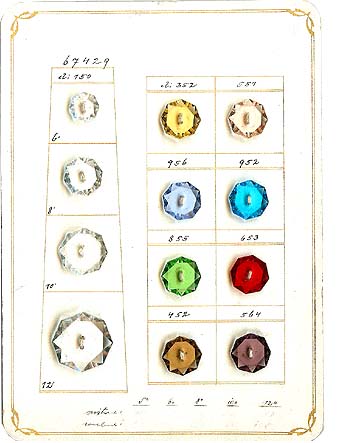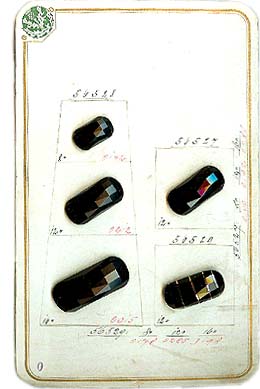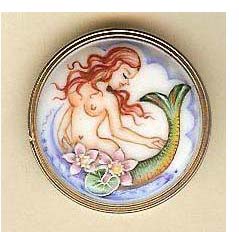|
The Czech Bead Industry:
The Germans Left Behind
I've always known that after World War Two the Germans living
in Czechoslovakia were deported en masse back to Germany as unwanted
refugees in a war they lost. These Germans were known as Sudeten
Deutsch, and had been living in the region of Bohemia for over
500 years. Although their heritage was German, for many of them
they had never been to Germany - nor had any family ties to Germany.
They were Czech. (or Bohemian, or Austrian when the region was
a part of the Austrian Empire).
Hitler's lust for empire swept them up into the German conquest
of Europe as the annexed state of Sudetenland, and suddenly they
were a part of Germany again. These were heady times, and while
Germany was winning the war they were on top of the world; but
when things turned sour and Germany ultimately lost the war,
the Czech people turned on their former citizens with bitterness
and hatred, and forced them out of their homes and out of their
country. In some instances the Germans of Gablonz had 48 hours
to pack a bag and leave the country; leaving behind their homes
and businesses. The best homes were occupied by Czech residents,
and the businesses were taken over by Czech workers who knew
how to carry on.
At least that is what I thought I knew from reading history
and talking to Czech bead people in Jablonec nad Nisou over the
last 12 years when visiting the area buying beads, and even talking
to Germans who were deported back to Germany and ultimately settled
in Neu Gablonz near Kaufburen where they continued to make glass
beads up until the present.
This is not an entirely true account of what really happened.
In May 2011 Jamie and I had an intense conversation with Christa
, who we have known for many years. She is well known to the
button world because she was working in the Library of Glass
and Cutom Jewellery Museum Tourist Information center in Jablonec
nad Nisou in 1990 through 1993 when bead or button tourists started
coming to town to find beads. Her first American contact was
Diane Fitzgerald; then Kathy Dannerbeck from Beads and Beyond
in Bellevue, Washington. Pretty soon Christa was the main link
to bead and button factories and tours of the region by many
people who started importing Czech glass beads back to their
countries.
 During our special
tours, Christa would bring her private collection to our hotel
and allow us to dig through it and purchase selected items she
was willing to sell. She told us about her personal life story. During our special
tours, Christa would bring her private collection to our hotel
and allow us to dig through it and purchase selected items she
was willing to sell. She told us about her personal life story.
 Christa was 4 years
old when she and her mother heard that her father had been wounded
outside of Vienna, Austria in April 1945. Then they lost contact
with him until 1947, when they found out through a Czech neighbor
that he was in an internment camp for German soldiers in Poland.
Yes, Christa was German….something we never knew before. Christa was 4 years
old when she and her mother heard that her father had been wounded
outside of Vienna, Austria in April 1945. Then they lost contact
with him until 1947, when they found out through a Czech neighbor
that he was in an internment camp for German soldiers in Poland.
Yes, Christa was German….something we never knew before.
Christa and her mother were living alone in their old house all
this time. When the Czechs forced all the Germans to leave Gablonz
(Jablonec), and Czechoslovakia, the decision was based on many
things; the attitude of the individual Germans during the war,
the attitudes of the Czechs in positions of authority, and in
Christa's case, the condition of her house. It was built in 1730,
and in crumbling decay from years of neglect while her father
was gone off to war. No-one wanted it, so she and her mother
were allowed to stay in it. But they weren't welcome there. They
were hated and despised by the Czechs. But with nowhere to go,
and not being forced out, they stayed.
In 1947, a letter was delivered to Christa's mother by a Czech
neighbor (also despised by the Czech's because they collaborated
with the Germans during the war and therefore willing to socialize
with Christa and her mother), that her father was imprisoned
in a German internment camp just over the border in Poland. The
Czech's refused to deliver letters directly to Germans still
living in the area, hence the letter being delivered to the neighbor.
They were able to petition the local authorities to release him
to come home because as a road maintenance worker he had a skill
the town needed. He weighed 98 lbs the day he arrived home.
Anyway, after the first, knee jerk reaction of the Czech authorities
to deport all Germans from Czechoslovakia, they had second thoughts,
because most of the Germans had skills that were needed to keep
the community functioning, let alone the businesses previously
owned and run by the Germans which were now collapsing from mismanagement.
The last remaining Germans in Jablonec nad Nisou (approximately
5,000) were forced to stay and work in the area, teaching the
local Czechs their jobs. It was only in 1964 that these Germans
were finally allowed to leave. But by then they were not forcibly
deported, just encouraged to leave.
Some Germans were contacted in Germany and invited back to
Jablonec, even given their big beautiful houses back to live
in while they trained local Czechs their business operations
so that beads and crystals and chandeliers could still be made
and exported to the world. The Germans weren't given back their
business's though, just their houses. And they still weren't
liked, just tolerated.
One German couple we had met many years before in Kaufburen,
the Blauschkes, had told us their story. They were German lampwork
bead makers who had been deported in that initial first wave
of evictions from the country, and they had had 48 hours to leave.
They lost their house to a Czech peasant family, along with most
of their belongings they couldn't take with them. In 1989, right
after the Velvet Revolution, they traveled back to Jablonec to
find their house, and it was in crumbling disrepair after 44
years of communist neglect. They knocked on the door and an old
lady answered and let them in. They had tea and talked to her
for hours. They sat on their old furniture, and looked at artwork
on the walls that they had owned. It was still all there. The
Blauschkes go back every year and have maintained a friendship
with that lady ever since.
Another German couple we just met on this last trip live in
a small glass town an hour away from Jablonec, a father and daughter
team who paint vases and buttons for a living. The father is
an Austrian, whose grandfather relocated to the region in 1830,
and his daughter is Czech. He speaks only German and Czech; his
daughter only speaks Czech. Communication was difficult to say
the least, but our friend who was with us spoke some German,
so we got along okay. The Father told us he had learned his trade
when  a German painter
came through town and taught everyone how to paint with ceramic
on glass. He was one of many. a German painter
came through town and taught everyone how to paint with ceramic
on glass. He was one of many.
When the communists invaded in 1968 they forced him to work
in a huge factory painting vases for export. Each painter had
one job painting the same thing over and over, every day, then
the next painter would get the vase and paint his portion before
passing it on until finally that vase was completed. It was only
in 1989 after the Velvet Revolution that he was able to open
his own business with his daughter and paint vases and buttons
in the style he wanted. He is truly an artist, and has passed
it down to his daughter and granddaughter. He still refers to
Jablonec as Gablonz, and has bad memories of the war and all
the years after. He was a German with no place to go, and the
Czechs did not deport him. A lot of what he told us was in German,
and Austrian German at that, so most of what he told us was lost
in the interpretation.
Both Christa and this father/daughter couple are happy now
with their lives. Christa says it is only the old Czechs still
alive who remember the war that are still angry with the Germans,
and treat her with ugliness. The young people don't care, they
are willing to forgive and forget. Christa's house is now repaired
and is very lovely. German tourists are welcomed to the area
to come for holidays.
=========================================================
J-Me and Guy own Wild Things, a small family run import business
located deep in the Sierra Nevada foothills of Northern California.
They also lead tours to the bead areas of Czech Republic and
Hong Kong. They can be contacted at www.wildthingsbeads.com
or by phone at (530) 743 1339.
   |